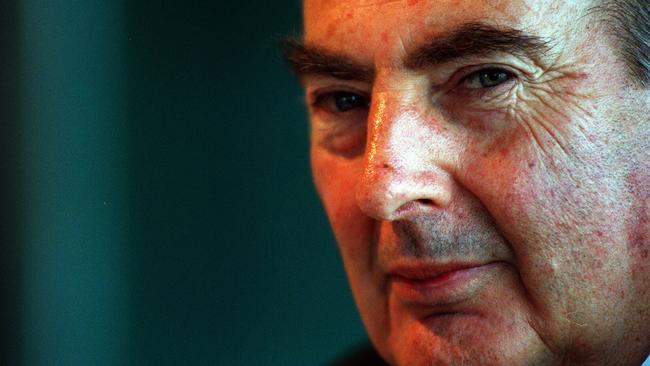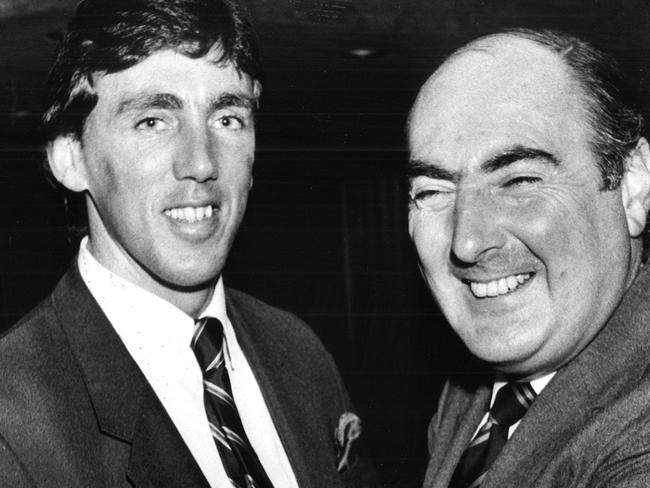Farewell to a ‘godfather’ of footy, Richard Seddon
As chief of Melbourne Football Club Dick Seddon was seen as an architect of the club’s revival and one of the godfathers of the modern game. In everyday life he was viewed as an “absolute gentleman”.

Victoria
Don't miss out on the headlines from Victoria. Followed categories will be added to My News.
Dick Seddon fretted during the 2021 Grand Final.
He had a bigger stake than most Demons fans.
Seddon, the successful commercial lawyer, had as chief executive injected dollars and professionalism into the club in the 1980s.
He had had wins; getting Ron Barassi back to the club; coaxing Jim Stynes and Sean Wight to uproot from Ireland to pursue a foreign sport on the other side of the world.
There were lesser moments, too – middling team performances, as well as a novel life insurance scheme which invited wealthy club members to make the club a $100,000 beneficiary upon their deaths.
At the time — recruiting Brownlow Medal Kelvin Templeton and Peter Moore players in the biggest ever VFL deals, luring Barassi with a reported $250,000 over three years — Seddon admitted that “we may have gone a bit overboard”.
Called an architect of the club’s revival, he had by 2021 waited 57 years since the last flag. An overdue triumph was nigh.
But Seddon was much like every other Melbourne fan that grand final night. He was conditioned for defeat, and fretted about the third term deficit to the Western Bulldogs. He thought his Demons would lose.
He got to see that long-deprived premiership, even got to hold the cup itself when the club visited his eastern suburbs retirement village a few months later.
Seddon wore his trademark grin for the posed photos, and spoke of being “humbled” by the club’s gesture.
The moment played like a pleasing bookend to a rich and varied life.

Seddon passed away late last month, at 87.
His farewell was held at Christ Church in South Yarra on Thursday.
Footy scribe Mike Sheahan was there, as well as Melbourne chief executive Gary Pert, along with former VFL/AFL boss Ross Oakley and Collingwood president Jeff Browne.
In such circles, Seddon was considered an “absolute gentleman” who was generous with his wisdom. He was also “one of the godfathers of the modern game”.
After the father of two wrenched the Melbourne club from its amateur tethers, he became a VFL commissioner. The league was reinventing itself in seismic waves of merger talks and salary limits.
Seddon was a critical player in eliminating the tribal weaknesses of the VFL and forging draft and salary cap rules which would equalise the AFL competition so that every club could chase success. Insiders still say that the changes saved the competition from extinction.
Later, over five years in New York, as the Australian Investment Commissioner, he and wife Carol cruised regularly on the yacht (and its 50-seat dining room) of magazine publisher Steve Forbes.
Stynes was always grateful to Seddon for the footballing opportunity; he, along with player and coach Stan Alves spoke to the Australian Chamber of Manufactures when Seddon took over as chief executive in 1997.
Seddon likened business to sport.
“I believe whether you are fighting a war or managing or coaching a sporting team or running a business, a lot of the management principles are the same,” he told a newspaper at the time.
“To my mind, 80 per cent of your performance really depends on attitude. Sure, you’ve got to have skill, you’ve got to have knowledge, but I reckon that’s about 20 per cent of a successful outcome. I reckon 80 per cent depends on attitude.”
He later described his four years of running the Melbourne footy club as a “bit of an indulgence”. By then, he was wealthy enough to not need to work.
He observed the social fallout effects of economic rationalism while in the US.
“I’ve been pretty right wing all my life and a believer in the market forces . . . but I did see firsthand the legacy of Reaganomics … I certainly developed a stronger social conscience . . . and saw the unfairness of it and the big gulf between the rich and the poor,” he said in the 1990s.
The football administrator’s own sporting career ended early. He had been a ruckman at Ballarat Grammar until he did his knee.



